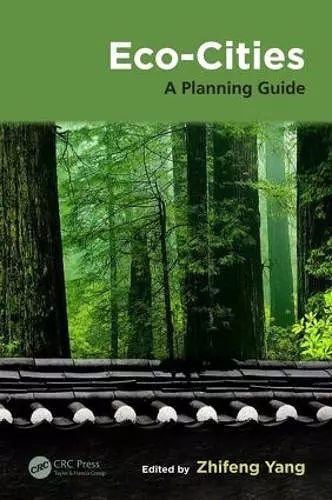Eco-Cities
A Planning Guide
Format:Hardback
Publisher:Taylor & Francis Inc
Published:15th Oct '12
Currently unavailable, our supplier has not provided us a restock date
This hardback is available in another edition too:
- Paperback£81.99(9781138077065)

As cities undergo vast changes due to industrialization, urbanization, and globalization, environmental considerations assume a growing importance in the urban planning processes of an increasing number of governments around the world. Several cities and regions around the world have already enacted policies that signal the emergence of a paradigm of sustainability in eco-cities planning. Providing an overview of urban ecosystem structure, function, and change, Eco-Cities: A Planning Guide addresses how to successfully accomplish eco-city planning that meets government requirements. It adds a new dimension to the understanding and application of the concept of urban sustainability, based on hypotheses about feedback between social and biogeophysical processes.
Emphasizing integration, the first part of the book discusses various aspects of planning theory. It presents three innovative theories for socioeconomic models: a theory on the locational choices made by households and firms, an urban version of the stream continuum concept, and an application of metacommunity theory to the fragmented urban biota. These theories raise new urban planning questions and stimulate integrated modeling. The book also introduces urban planning modeling that uses existing social, vegetation, ecohydrological, and ecosystem service modules but is refined and operated for enhanced cross-disciplinary integration and prediction. The second part of the book consists of several case studies of Chinese eco-cities covering a majority of the urban development patterns that offer in-depth examples of planning practices currently in use.
Drawing on experimentation, comparison, long-term measurement, and modeling, this fascinating guide helps readers better understand eco-cities and eco-landscapes as integrated, spatially extensive, complex adaptive systems. It lays a solid foundation for engagement between urban planners, researchers, educators, policy makers, and citizens as they work to adapt to changing environmental, social, and economic conditions.
"Eco-Cities: A Planning Guide is an essential guidebook to a powerful new way of understanding the relationships between humans and nature in the context of our modern urban ecosystems. Providing a comprehensive theoretical basis, several case studies, and the explanation of very innovative methodologies for integrated urban ecosystem assessment, this book will become a key reference for students, scientists, professionals, and policy makers interested in planning and managing sustainable cities."
—Pier Paolo Franzese, Parthenope University of Naples, Italy
"What fascinates me most is the detailed Chinese eco-city cases and specific eco-city planning processes. Anyone interested in the ‘how and why’ of Chinese eco-city planning history and processes would do well to use this book as a starting point."
—Guoqian Chen, College of Engineering, Peking University, China
"Overall, the book is a needed contribution in combining concepts of ecology and urbanism and in moving sustainable development from theory to practice."
—Brian D. Fath, Towson University, Maryland, USA
"Eco-Cities: A Planning Guide is an essential guidebook to a powerful new way of understanding the relationships between humans and nature in the context of our modern urban ecosystems. Providing a comprehensive theoretical basis, several case studies, and the explanation of very innovative methodologies for integrated urban ecosystem assessment, this book will become a key reference for students, scientists, professionals, and policy makers interested in planning and managing sustainable cities."—Pier Paolo Franzese, Parthenope University of Naples, Italy
"What fascinates me most is the detailed Chinese eco-city cases and specific eco-city planning processes. Anyone interested in the ‘how and why’ of Chinese eco-city planning history and processes would do well to use this book as a starting point."—Guoqian Chen, College of Engineering, Peking University, China
"Overall, the book is a needed contribution in combining concepts of ecology and urbanism and in moving sustainable development from theory to practice."—Brian D. Fath, Towson University, Maryland, USA
ISBN: 9781439883228
Dimensions: unknown
Weight: 1370g
620 pages